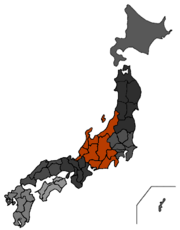Chubu: Difference between revisions
imported>John Stephenson (linking) |
imported>John Stephenson (whoops...) |
||
| Line 3: | Line 3: | ||
{{Image|Chubu-map-Japan.png|right|180px|Location of Chubu (map excludes [[Mie prefecture]] and includes [[Fukui prefecture|Fukui]]).}} | {{Image|Chubu-map-Japan.png|right|180px|Location of Chubu (map excludes [[Mie prefecture]] and includes [[Fukui prefecture|Fukui]]).}} | ||
The exact borders of Chubu are a matter of some controversy. Eight prefectures are indisputably within | The exact borders of Chubu are a matter of some controversy. Eight prefectures are indisputably within Chubu: [[Aichi prefecture|Aichi]], [[Gifu prefecture|Gifu]], [[Ishikawa prefecture|Ishikawa]], [[Nagano prefecture|Nagano]], [[Niigata prefecture|Niigata]], [[Shizuoka prefecture|Shizuoka]], [[Toyama prefecture|Toyama]] and [[Yamanashi prefecture|Yamanashi]]. [[Fukui prefecture]] is also generally identified as part of Chubu, as is sometimes [[Mie prefecture|Mie]].<ref>This article assumes that Chubu comprises nine prefectures, including Fukui and excluding Mie (in the [[Kansai]] region). Official Mie prefectural information, however, suggests that Mie is in ''both'' Kansai and Chubu (more precisely, the [[Tokai]] sub-region of Chubu). See ''Mie Prefecture'': '[http://www.pref.mie.jp/ENGLISH/overview/e_p03.pdf Mie's Location]'.</ref> | ||
The total population of the Chubu region was 21,798,000 in 2006.<ref>''Japan Statistical Yearbook'': '[http://www.stat.go.jp/data/nenkan/zuhyou/y0203000.xls Population by Prefecture 1920-2006]'. Ministry of Internal Affairs and Communications. .xls document.</ref> The area forms part of an urban corridor running north-eastwards towards [[Tokyo]] from [[Kansai]] towards the [[Kanto]] region; this makes Chubu part of one of the most densely-populated areas of the world, home to over half the country's population.<ref>''Japan Times'': '[http://search.japantimes.co.jp/mail/nn20070803a2.html Population shrinks again despite increase in births]'. 3rd August 2007.</ref> | The total population of the Chubu region was 21,798,000 in 2006.<ref>''Japan Statistical Yearbook'': '[http://www.stat.go.jp/data/nenkan/zuhyou/y0203000.xls Population by Prefecture 1920-2006]'. Ministry of Internal Affairs and Communications. .xls document.</ref> The area forms part of an urban corridor running north-eastwards towards [[Tokyo]] from [[Kansai]] towards the [[Kanto]] region; this makes Chubu part of one of the most densely-populated areas of the world, home to over half the country's population.<ref>''Japan Times'': '[http://search.japantimes.co.jp/mail/nn20070803a2.html Population shrinks again despite increase in births]'. 3rd August 2007.</ref> | ||
Revision as of 01:54, 22 June 2010
Chubu (中部地方 Chuubu-chihoo) is a region of Japan located on Honshu island. It consists of nine administrative areas (prefectures), is home to the city of Nagoya, among others, and is also the place where Japan's highest mountain, Mount Fuji (富士山 Fuji-san) can be found.
The exact borders of Chubu are a matter of some controversy. Eight prefectures are indisputably within Chubu: Aichi, Gifu, Ishikawa, Nagano, Niigata, Shizuoka, Toyama and Yamanashi. Fukui prefecture is also generally identified as part of Chubu, as is sometimes Mie.[1]
The total population of the Chubu region was 21,798,000 in 2006.[2] The area forms part of an urban corridor running north-eastwards towards Tokyo from Kansai towards the Kanto region; this makes Chubu part of one of the most densely-populated areas of the world, home to over half the country's population.[3]
Footnotes
- ↑ This article assumes that Chubu comprises nine prefectures, including Fukui and excluding Mie (in the Kansai region). Official Mie prefectural information, however, suggests that Mie is in both Kansai and Chubu (more precisely, the Tokai sub-region of Chubu). See Mie Prefecture: 'Mie's Location'.
- ↑ Japan Statistical Yearbook: 'Population by Prefecture 1920-2006'. Ministry of Internal Affairs and Communications. .xls document.
- ↑ Japan Times: 'Population shrinks again despite increase in births'. 3rd August 2007.
